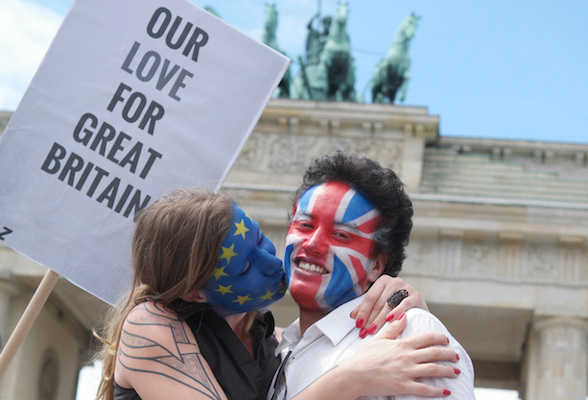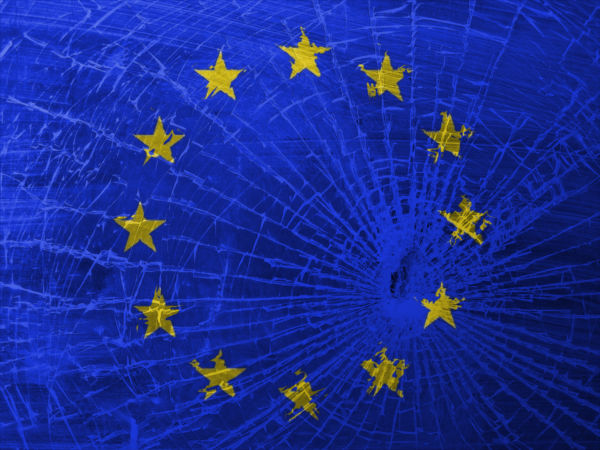By Dimitris Konstantakopoulos
Fukuyama, an ex-official of the State Department, with very poor intellectual capacities, became world famous in 1990 with his idea that History has ended. Now History is back, in full steam.
One may agree or disagree with Brexit. But he has to admit that here we have to do with a clear anti-estabishment revolt of the British, a revolt with clearly national but also clear class characteristics. Look for instance the pattern of the vote. City voted overwhelmingly to remain in the Union, the popular, de-industrialized and agricultural regions of the country, the “lost of globalization”, very much for Brexit. (As has happened in many cases, during the collapse of the Soviet Union, nationalism was not the only direct reason of the quest for independence of the Republics, antagonisms for power and property were very much the reason, still it was the national idea which offered a ready basis of legitimacy for the break down).
The result represents also an enormous historic defeat for Dr. Scheuble and the whole German leadership, it understands or not (as so many times has happened in German history).
The question is not Britain, the question concerns all Europe
It is not only that Britain is exiting the EU. The Union itself has entered a process of a probable collapse as a structure. This process will leave nothing unaffected. Internal equilibriums in various national states, the European economic order and geopolitics. It is not only the neoliberal (under German co-domination) EU which will probably leave the scene of history. It is all the European “ancien regime” which is prepared to leave. At least the one consecrated with the adoption of the Maastrich Treaty and the triumph of neoliberalism. (Indirectly also with the political choice to go on with NATO enlargement, of which the EU enlargement was the political-economic part).
Let us hope that the collapse of post-national neoliberalism will not lead also to the collapse of the fundamental achievements of European peoples after 1945. From now on we enter a “chaotic” period, in the mathematical sense of the word, with very different positive or negative possibilities.
An unacceptable Union
They will do and say everything to reinterpret, to diminish and to distorde the meaning of the British vote, still the verdict is unequivocal and its significance explosive.
The European Union, at least as it stands now and with the policies and the arrogance it is producing, is simply unacceptable not just by British, but by a clear majority of all European citizens. The Maastricht system, institutional incarnation of neoliberalism (and atlanticism), imposed in Western Europe in the wake, and under the enormous impact of the collapse of “Soviet socialism”, and also of the Mitterrand (and the British Left) defeat and capitulation and of the German reunification, as it was executed, proved to be a socially regressive, economically inefficient, politically oligarchic, antidemocratic structure.
It is collapsing in front of our eyes, as the result of the first wave (2008) of the financial crisis and the way European leaders reacted to it. Its destruction could catalyze a second wave of financial-economic crisis.
The final political blow to the legitimacy of the European Union was inflicted last year, when all the world saw the way Berlin and Brussels crashed Greece, a member of the European Union.
Even if they did not say anything at the time, everybody drew the conclusions about the nature and the character of this Union and of German policy in Europe. It was only a question of time before the political fall-out of this “victory” turns back, hitting those who masterminded it. This is what is happening now.
Greeks were too weak to succeed in their rebellion. British were too strong to accept such a Union. It was History, not the Left or the Right, which put European revolt on the order of the day. European Left proved in 2015 too hesitating, too weak, too unwilling to become the leader of the Revolt till the end. A part of the European Right was there to fill the vacuum, at least at that stage. And it did it.
By voting to leave the European Union, British citizens confirmed, as contradictory as it may seem, that they are deeply Europeans, in their own way of course and following the particular path history and the international position of their country has determined.
By voting the way they voted, British did the same that did, before them, the citizens of Cyprus, of France, of Netherlands, of Ireland, of Greece, every time they had the opportunity. They rejected massively the policies produced and imposed by the elites, both national and European ones (the two more and more indistinguishable), in spite of the enormous terror and propaganda campaigns to do the opposite.
European elites answered to this repeated cry of peoples by saying to them that they don’t understand what they are voting for, by ignoring the direct expression of the popular will and by doing the exact opposite of the policy they were mandated by their electorate to apply, in complete disrespect of the most elementary democratic principles.
The Marie Antoinette syndrome
Maybe European elites thought that, if there is divorce between people and its rulers, they should change people, as once Berdold Brecht put it to the adress of the rather deaf East German rulers of his time.
By doing it time and again, they simply laid the ground for a strong European nation to go one step further than previous revolts, voting clearly for a divorce with Brussels. Though some forces in the British Left have supported this, so it would be inexact to attribute everything to the Right (the opposite happened in Greece where a part of the Right supported the revolt), it did that under the initiative and the domination of Rightist forces, because they were the only available to play this role. This may have and it will have of course a huge impact on the follow-up, but is not changing the fundamentals roots and the character of the revolt. It makes more, not less necessary for the European Left to review and change in a radical way its policy towards both the national and the European questions. If it will not do it, it will simply disappear just as the regime is disappearing.
In Britain, but also everywhere in the continent, the European Union is more and more understood by a majority of the citizens as a system not defending people from, but organizing social regression. (Some of its leaders even say it openly, probably unaware of the political consequences. Barroso for intance said some years ago that everybody knows that future generations will live in worse conditions than in the past! Some advisors of Sarkozy have stated openly their goal to overrun completely the social project incarnated in the historic compromise French communist resistance passed with De Gaulle, in exchange for resigning from the goal of a revolution in France, but also because De Gaulle supported in fact a “social-democratic” and national project for his country).
In the western and in the southern parts of Europe “European integration” as it is realized, it is also more and more understood as a mechanism to take back from people the political freedoms and rights they used to enjoy after the victory over Nazism and Fascism, in 1945 and, as far as it concerns Portugal, Spain and Greece, after the collapse of the dictatorships in 1974. It is not a coincidence the fact that JP Morgan for instance, published, some years ago, a report stating that the huge obstacle to reform which needs to be overcome are the “antifascist constitutions” South European nations acquired after 1974!
It is important to remark at this point that there is from time to time a lot of talk of “federation” in Europe, but no real project of federation. By “federation” they mean, in really Orwellian terms, not any federation of European nations and states. They mean their subordination to the power of the High International Finance (and the US as far as it concerns geopolitical questions). There is no more telling symbol of this subordination, and of the enormous lie hidden behind all federation talk, than the appointment of a Goldman Sachs banker, Mr. Mario Dragui, in the position of the President of the (independent, but only from people and nations) European Central Bank, in fact to the position of an unelected European super Prime Minister.
The revolt of Europeans is developing along national lines for a number of reasons. Most people, especially the most threatened, and in particular the more traditional working class, feel the need, by instinct, before they hear anybody telling them, of state and of nation to protect them. Some people in the Left believe this is reactionary, but they have to explain why is progressive the replacement of national states from the international rule of big Banks (many of them and the most important, they are not even European!)
It is not a coincidence, that those revolts are happening mainly in nations which have, more or less, a strong national tradition. Cypriots have done one of the first anti-colonial revolutions after the 2nd World War, in spite of being a handful of people opposing an Empire. In the administration councils of French multinationals they speak now English, still France remains the country of the Marseillaise and it has a tendency to remember it, every time it feels the need. By the way, the first communist revolution in modern European history, the Paris commune, begun because French bourgeoisie wanted to handle the capital to the Germans. Netherlands is one of the birthplaces of European freedom, the country of Spinoza. Ireland as a country has been defined by the revolt against foreign rule. Greeks have mounted a ferocious resistance against Hitler, when most European nations had compromised with him. They inflicted in 1940-41 the first military defeat in Europe to the Axis and their subsequent resistance has provided to the Soviets and the “General Winter” precious time, while it disturbed seriously Rommel’ s logistics in Africa. (By the way they paid a very heavy price, as they were betrayed or crashed by their Allies after the War. They risk now to suffer the same fate, paying a terrible price for both their revolt and for the unpreparedness and betrayal of their leaders).
Neoliberals have been able to control nearly all the media and political landscape, intellectuals and the public opinion. They were even capable of erasing mush of History from the program of western universities. You can be a graduated economist nowadays, but ignore completely Keynes or Galbraith, a political scientist, without having read one page of Plato or Aristotle, a psychologist ignoring the work of Freud. Even most physicists do not know how Kopernic or Galileo were thinking.
By controlling everything, they fell victim of their success, believing finally blindly their own propaganda. By saying so much time and on so many occasions that “There is no Alternative”, they became finally completely incapable of politically supporting and struggling for their own alternative. Not to speak about understanding what is going on and how people are thinking.
In the environment of prosperity of the ’90s, all that seemed extremely strong and successful. But as both the middle classes and more oppressed social strata felt the pressure of the economic crisis and then of the financial crisis of 2008, the material conditions for neoliberal hegemony begun to collapse and with them the political and ideological foundations of the European Union. Unsatisfied by the pro-globalisation turn of many leftist politicians and parties, the traditional working class has in some cases deserted them moving to the far right, the other anti-establishment pole. The identities neoliberalism tried to suppress for ever, did not disappear, they went “underground”, remaining deeply inside the collective (and nationally organized) subconscious, ready to be waken up when people feel the need to legalize their resistance to a threatening new order.
Political corectness finished by blinding its architects and rehabilitating many of the very same ideas it was persecuting!
Right and Left, destroying and building
European Right seems more fit to the role of finishing the collapsing European Union and destroying the existing European order.
But the real question is not this any more. The real question is what will replace the existing European order and how to avoid the rather unavoidable, in the middle term, collapse of the existing European order will not lead also to the collapse of Europe.
For various reasons, the simple return of Europe to its nation-states, cannot be the solution. And even if British, French and Germans can as a minimum think and try it, nobody else can seriously believe to such a perspective. This is why, the defense of the nation-states and of what remains of democracy in their context is absolutely necessary, but in the same time is impossible without the emergence of a new project, socio-economic and international, able to replace the collapsing neoliberal Order.
If Europeans needed finally the Right to destroy, they will probably need some sort of Left to build. But this should be a much more radical, much more serious, much more dedicated Left, deprived of its illusions about the EU and globalization and its opportunism.
The result of the British referendum illustrates well the hard choices Sanders and Corbyn will be pushed to make, between the radicalism which propelled them to their positions and the conservatism of their parties. To succeed they should find a way to unite the dissent, the reformism of those who still have much to lose and those who have nothing to lose. The conclusions the Podemos leadership in Spain and the leaders of the French and the German Left will draw from the British case may be be also of crucial importance not only for the immediate future of the continent, but for its History.











